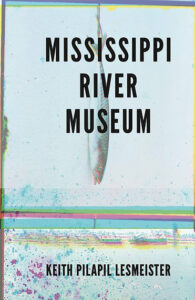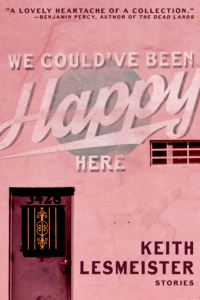
Mississippi River Museum, a fiction chapbook, published with WTAW Press, 2023
When Joe Patterson arrives in a rural upper Midwestern river town in order to fix up and sell his late father’s “cabin,” a host of issues for which he’s not prepared confront him: the house is in shambles, his body aches, his checking account is almost empty, and he meets a twelve-year-old boy in need of help. A story of hope, loss, and redemption, Mississippi River Museum explores the unlikely friendship between two orphans who bond over fishing, bikes, and eating fried catfish.
Praise for Mississippi River Museum
Mississippi River Museum is a gut punch of an American story, set in a corner of northeast Iowa that simmers with menace and a slow-moving beauty. Its hero, Joe Patterson, breaks the mold of the usual rural archetypes: he’s biracial, full of heart, and aching, though he doesn’t know it, for a family of his own. Keith Pilapil Lesmeister’s chapbook is an instant classic.
—Benjamin Anastas, author of Too Good to Be True: a memoir
In Mississippi River Museum, Keith Pilapil Lesmeister works his slow and assured magic, reeling the reader in like one of the sunnies Joe Patterson tries to catch in the story. Each surprise comes as a flash breaking the surface of the clean, fluid prose. This is an arresting and redemptive tale about a young man and a boy, about generations of hurt being handed down. Lesmeister depicts the upper Midwest like no other author I know, refusing to turn away from its ugliness—or its devastating environmental beauty. On the merit of this story alone, I’d read anything Keith Pilapil Lesmeister writes.
—Rachel Swearington, author of How to Walk on Water and Other Stories
In his Mississippi River Museum, Keith Pilapil Lesmeister has created Joe Patterson: a compelling character who struggles with his sense of self and place; struggles with a past that meanders menacingly like an almost still river through his blood; struggles with those stories we all carry inside to protect ourselves from admitting the truth. There’s a desperate beauty to Joe’s searching story, his almost quiet and tender loss, confusion, and rage. His heart is big, his vision steadily moving towards clarity. Lesmeister composes glimpses into the racism and violence Joe faces, as he begins to care, change, and act to make the most of his “work-in-progress” life. In this unique and necessary region along the upper Mississippi, Keith Pilapil Lesmeister has composed a powerful and beautiful fiction.
—Fred Arroyo, author of Sown in Earth: Essays of Memory and Belonging
Mississippi River Museum is Keith Pilapil Lesmeister’s masterclass in patient interiority and how to finesse nuanced storytelling out of ache, river silt, and catfish scales. Don’t miss out on one of the finest Midwestern writers at work.
—Ron Austin, author of Avery Colt is a Snake, a Thief, a Liar
Purchase a copy here.

The inaugural issue of an annual anthology: rural stories by writers of color who hail from and write about those rural or semi-rural spaces. Info about the contributors and how to order a copy can be found at EastOver Press.
If you’re an educator interested in using the anthology for your class, please contact info@eastoverpress.com.

In his first collection of short fiction, originally published with MG Press in 2017, Keith Pilapil Lesmeister plows out a distinctive vision of the contemporary Midwest. A recovering addict chases down a herd of runaway cows with a girl the same age as his estranged daughter. A middle-aged couple rediscovers their love for one another through the unlikely circumstance of robbing a bank. A drunken grandmother goads her grandson into bartering his leftover booze for a kayak. The daughter of a deployed soldier wages a bloody war on the rabbits ravaging her family’s farm.
These stories peer into the lives of those at the margins — the broken, the resigned, the misunderstood. At turns hopeful and humorous, tender and tragic, We Could’ve Been Happy Here illuminates how we are shaped and buoyed by our intimate connections with others — both those close to us, and those we hardly know.
Praise
A gritty, emotionally sensitive clutch of stories.
—Kirkus Reviews
The Middlewesterners in Keith Lesmeister’s charming collection We Could’ve Been Happy Here share more in common with Ethan and Joel Coen’s Fargo than any of Willa Cather’s stalwart pioneers. But these characters and their stories are perfectly authentic, hilarious, and offbeat. This collection is the genuine article.
—Nickolas Butler, author of Shotgun Lovesongs and The Hearts of Men
The deceptively quiet stories in Keith Lesmeister’s We Could’ve Been Happy Here lay bare the inner lives of deceptively ordinary people in the deceptively normative state of Iowa. Like a heartland Chekhov, Lesmeister artfully refuses to tell us how things turned out—did that slacker stay sober? did that nice middle-aged couple who robbed a bank on a lark ever get caught? Instead, he reveals how things are in his characters’ souls: often strange and dark, yet not without hope and love.
—David Gates, author of Preston Falls and A Hand Reached Down to Guide Me
These are brutal stories—brutally good, brutally urgent, brutally hopeful. In this extraordinary collection, Keith Lesmeister has granted his lucky readers a rare and stirring look into the soul of the middle west. His prose is as clean as the prairie wind, his characters as dangerous and refreshing as summer storms. We Could’ve Been Happy Here is a real achievement, a book that won’t let you go and you’re all the better for it.
—Bret Anthony Johnston, author of Remember Me Like This and Corpus Christi: Stories
There’s a tricky playfulness to Keith Lesmeister’s fiction. His characters are painfully flawed — but their goodness always shines through. And his humor lights up the page — but it’s so often a trapdoor to the sadness that unifies these stories. We Could’ve Been Happy Here is a lovely heartache of a collection.
–Benjamin Percy, author of The Dead Lands, Red Moon, Thrill Me, The Wilding and Refresh, Refresh
Once in a great while, you pick something up, and its great, subtle beauty hits you slowly and hard like the wave of an ocean. That’s the case for We Could’ve Been Happy Here, except the ocean is in Iowa. I’ve lived in the world that Lesmeister is showing us for over a decade, and the people who inhabit this collection are strange and sad and unique, and deeply familiar; I hurt for them. Collections like this only come around once in a while.
—Erika T. Wurth, author of Crazy Horse’s Girlfriend
Available at Bookshop.org